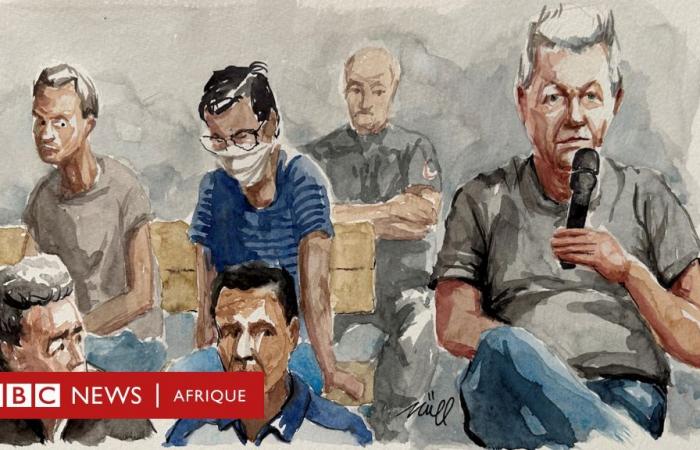Photo credit, Reuters
2 hours ago
They are young, old, strong, thin, black and white. Among them, firefighters, truck drivers, soldiers, security agents, a journalist and a DJ.
These are the 50 men accused of raping Gisèle Pelicot on the orders of her husband, Dominique Pelicot, 72, who drugged her for a decade with prescription sleeping pills.
The fact that they generally represent a microcosm of French society has earned them the nickname “Monsieur-Tout-Le-Monde”.
They await their verdict today, following a trial that began in September. If convicted, they collectively face more than 600 years in prison.
A few of them look defiant, but they mostly look down when answering the judges’ questions, occasionally looking up to meet the gaze of their lawyers who want to reassure them.
Warning : Some details of this story may seem disturbing to you
The 50 people all come from towns and villages located within a 50 km radius around Mazan, the village of Pelicots.
Some defense lawyers saw their banality as a valuable line of defense. “Ordinary people do extraordinary things,” said Antoine Minier, a lawyer representing three defendants.
“I think almost anyone could find themselves in a situation – maybe not exactly like this – but could be susceptible to committing a serious crime,” he told the BBC.
“My body violated her, but not my brain”
Prosecutors based their sentencing requests on aggravating factors.
The number of times the accused went to the Pelicot home, whether they touched Gisèle Pelicot sexually and whether they penetrated her.
Joseph C, 69, a retired sports coach and caring grandfather, faces four years in prison for sexual assault if convicted. This is the most lenient sentence requested by prosecutors.
At the other end of the scale, Romain V, 63, risks 18 years in prison. He was knowingly HIV positive and yet he is accused of raping Gisèle Pelicot six times without wearing protection.
Prosecutors were able to go to this level of detail because, unusually for a rape trial, there is a staggering amount of evidence against the defendants, the alleged assaults having been filmed over nearly a decade by Dominique Pelicot.
He admitted to all the charges against him and told the court that his 50 co-defendants were equally guilty.
Thanks to all the video evidence, none of the men could deny ever having been to the Pelicot home. But the majority of them vehemently contest the accusations of aggravated rape which would earn them heavy sentences.
French rape law defines rape as any sexual act committed by “violence, coercion, threat or surprise”; it makes no reference to the need for consent.
Therefore, while many acknowledge that what they did was technically rape, they also argue that they cannot be guilty of it because they were unaware that Gisèle Pelicot was not able to give consent.
“There is no crime without intent to commit it,” a defense attorney said.
“My body violated her, but not my brain,” insisted Christian L, a volunteer firefighter, to illustrate the convoluted reasoning of certain men.
The only one of the 50 men not to be accused of having raped Gisèle Pelicot is Jean-Pierre Maréchal, 63, nicknamed the “disciple” of Dominique Pelicot.
Having learned to drug his wife to abuse her, he did it for five years and admits it.
He attributes his crimes to his meeting with Dominique Pelicot, whom he says was “reassuring, like a cousin”. The prosecutor is seeking a sentence of 17 years in prison.
“Manipulated and trapped by Pelicot”.
Ahmed T, a 54-year-old plumber married for 30 years to his childhood sweetheart, said that if he had wanted to rape someone, he would not have chosen a woman in her sixties.
Redouane A, an unemployed 40-year-old, said that if he had wanted to rape Gisèle, he would not have allowed her husband to take videos.
Some also claim to have been intimidated by Dominique Pelicot, whose lawyer told the BBC that he was an “abominable character”.
In tears, nurse Redouan E told a skeptical courtroom he was too afraid of himself to leave the room. “Maybe the videos don’t show it, but I was really terrified,” he told the judges.
Others claim that they were offered drinks laced with drugs and therefore do not remember the meeting, although Dominique Pelicot has denied having done so.
Most, on the other hand, claim to have been manipulated or deceived by Dominique Pelicot, who made them believe that they were participating in a sexual game with a consenting couple.
“They were put in a situation of fraud,” Christophe Bruschi, Joseph C’s lawyer, told the BBC. “They were taken for a ride. “They were taken for a ride. »
But Dominique Pelicot always claimed that he had made it clear to the men that his wife was not aware of the plot.
He gave them instructions to avoid waking her or leaving traces of their presence, for example by warming their hands before touching his wife, or not smelling of perfume or cigarettes.
“They all knew, they can’t deny it. »
Photo credit, Getty Images
Families seek answers
Since September, the 50 men have appeared, one after the other, before the Avignon court.
Usually in rape cases, character investigations can last several days.
In this trial, due to the number of defendants, they were condensed into a few hours at most. Their lives were dissected at record speed, often turning the court session into a litany of stories of abuse and trauma.
Simoné M., a 43-year-old construction worker, said he was raped at the age of 11 by a family friend who employed him to tend livestock in the French overseas territory of New Caledonia.
Jean-Luc L, 46, a father of four, told the court that he and his family left Vietnam on a rubber dinghy when he was a child and lived in a refugee camp in Thailand for several years before settling in France.
Fabien S, a 39-year-old man who has already been convicted several times for drug trafficking and sexual assault of a minor, was abused and beaten by adoptive parents from a very young age. Like several others, he said he only realized during court-ordered psychiatrist appointments that his hazy and painful childhood memories actually constituted rape.
Many of the defendants’ wives, partners and family members were called to make character statements. They too sought to understand how the men in their lives could have found themselves “in this kind of situation,” as one woman put it.
“I was shocked, it doesn’t look like him at all. He was the joy of my life,” said Christian L’s elderly father.
The firefighter is also under investigation for possessing child abuse images, like four others, and faces 16 years in prison. “Something must have happened, he must have become depressed,” his father wondered.
I will always be there for him
Corinne, the ex-wife of Thierry Pa, 54, a former mason, said he had always been “kind” and “respectful” to her and their children and appeared to leave the door open to a reconciliation with him.
When they told me what he was accused of, I said: “Never, it’s impossible… I don’t understand what he did. I don’t understand at all what he’s doing here.” According to her, it was the death of their 18-year-old son that led her ex-husband to fall into a deep depression, to start drinking and to come into contact with Dominique Pelicot.
“I will always be there for him, whatever happens,” declared the Guyanese’s ex-partner Joan K. At 27, he is the youngest of the defendants and a former soldier in the French army.
He denied raping GP twice. While he knew Gisèle Pelicot would be unconscious, he said he did not realize she had not given consent.
A woman called Samira, in tears, said she had spent the last three and a half years “searching for answers” to the question of why Jerome V visited the Pelicots six times.
“We had sex every day, I don’t understand why he had to look elsewhere,” she said, sobbing. She is still in a relationship with Jérôme V, who was working in a grocery store at the time of his arrest.
He is one of the few who admitted to raping Gisèle, stating that he liked the idea of having “carte blanche” over her, but that he put it down to his “uncontrollable sexuality”.
Gisèle Pelicot: They raped me in full conscience
Many former and current partners of the accused were tested to see if they too had been drugged like Gisèle.
One woman said she would “always have terrible doubt” that the “respectful, caring and gentle man” she knew had also abused her without her knowledge.
Since the start of the trial, much emphasis has been placed on the need to find an element that connects all these men together.
A common denominator – apart from the fact that all the men went to the Pelicots of their own free will – “remains undiscovered”, said Gisèle’s lawyers.
But there is one indisputable commonality between all the accused: they all made the conscious choice not to go to the police.
Firefighter Jacques C, 73, said he had considered doing it but “life went on”, while electrician Patrice N, 55, said he “didn’t want to lose all the day at the police station.
In the first days of the trial, Gisèle Pelicot was asked if she thought it was legitimate to believe that the men had been manipulated by her husband.
She shook her head, “They didn’t rape me with a gun to my head. They consciously raped me.”
Almost as an afterthought, she asked, “Why didn’t they go to court?” “Why didn’t they go to the police? Even an anonymous call could have saved my life. »
“But none of them did,” she said after a pause. “Not a single one of them.”






